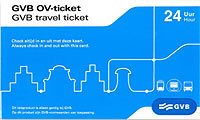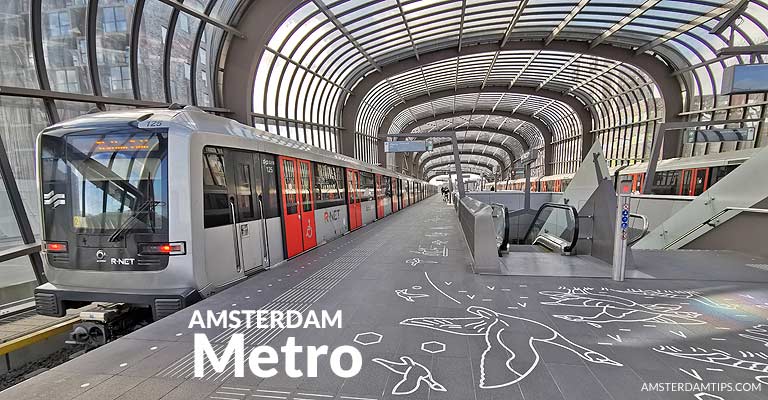
The metro in Amsterdam is a light rail network which is useful for travel down the central spine of the city and can get you to the outer suburbs of Amsterdam.
The Amsterdam metro is run by the municipal transport company GVB (Gemeente Vervoer Bedrijf) and is part of the R-NET network in North Holland.
There are 5 metro lines (M50/M51/M52/M53/M54) in Amsterdam with a total network length of 43km which includes 39 stations. It is the largest metro system in the Netherlands.
Best Amsterdam Metro Ticket
Amsterdam Metro Map
Below is our exclusive map (kaart in Dutch) of the Amsterdam Metro network which also highlights NS train lines.
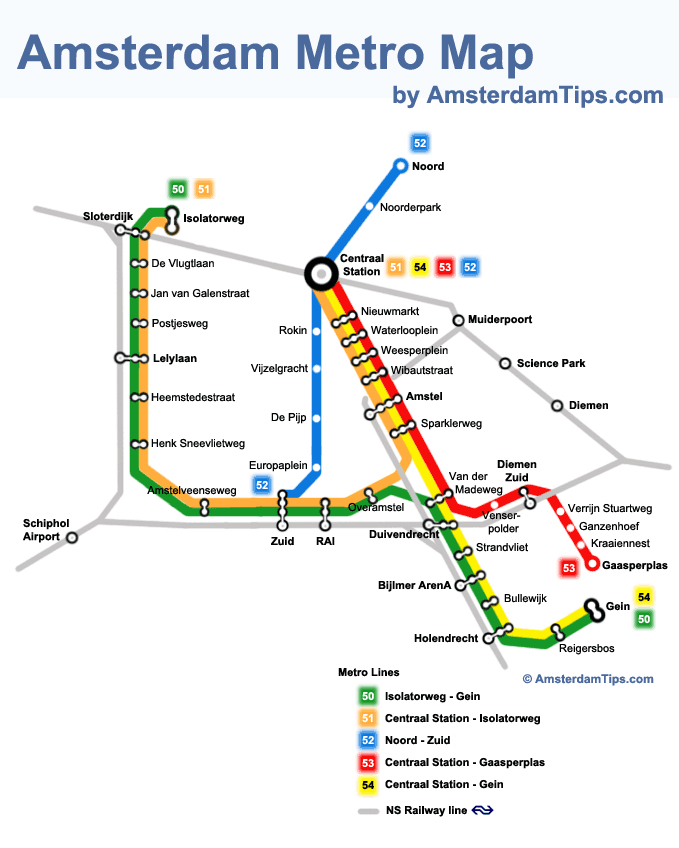
Note that Amsterdam Schiphol airport is accessible by train and not the metro. In the coming years line 52 may well be extended to the airport.
For reference, also see our Amsterdam Rail Network Map
Amsterdam Metro Tickets (2024)
There are various options for buying GVB Amsterdam metro tickets. Essentially, you can either pay for your single journey or buy a multi-day ticket which can offer significantly greater value. All passengers aged 4 or over must have their own ticket, children 0-3 travel free.
How To Use the Amsterdam Metro: Travel on any type of ticket requires that you check-in and check-out of your journey. For the Amsterdam metro this is done going through the station gates by holding your ticket / scanning a QRcode onto the card readers on your right-hand side. Your ticket is simply validated on first check-in.


You then go to your platform and board the train. At the end of your journey you check-out at the gate barriers to exit the station.
Where transfers are available on the same platform (for example: metro to train) you will also find stand-alone card readers on the platform to check-in or check-out as required.
Multi-day Tickets
 As mentioned above, the best value tickets for visitors are the 1-7 day GVB multi-day tickets. These offer unlimited travel during the validity of the ticket. They are valid on the Amsterdam metro, GVB buses and Amsterdam trams.
As mentioned above, the best value tickets for visitors are the 1-7 day GVB multi-day tickets. These offer unlimited travel during the validity of the ticket. They are valid on the Amsterdam metro, GVB buses and Amsterdam trams.
If used well the cost-per-ride can be significantly lower than standard one-way tariffs. Buy GVB 1-7 day tickets here – from authorised seller GetYourGuide, which allows instant download and immediate use on a smartphone.
There are 2 other multi-day tickets available which are essentially an upgraded version of the GVB ticket and can be also used on Amsterdam trams.
The Amsterdam Travel Ticket (GVB day ticket + airport journey) and the Amsterdam & Region Travel Ticket (GVB day ticket + all regional transport).
This table summarises the features:
| Good for AMS airport | Best for Excursions |
 |  |
| Amsterdam Travel Ticket | Amsterdam & Region Travel Ticket |
| 1/2/3 days | 1/2/3 days |
| €18/€24/€30 | €21/€31.50/€40.50 |
| Valid on all GVB transport (trams/metro/buses) in Amsterdam | Valid on all GVB transport (trams/metro/buses) in Amsterdam |
| Valid on Schiphol airport train + 397 airport bus | Valid on Schiphol airport train + 397 airport bus |
| Valid on trains between all Amsterdam stations | Valid on regional NS trains + EBS/Connexxion/Arriva buses in region |
| Calendar day basis | Calendar day basis |
| Card only (not digital) | Card only (not digital) |
| Order here | Order here |
| more info | more info |
Do note that these 2 cards are valid on a calendar day basis and not 24 hours like the GVB multiday ticket.

Amsterdam Metro single fares
There are essentially 3 types of single fare.
- The standard single GVB 1 hour fare ticket which costs €3.40 in 2024.
- A distance based fare – calculated as a €1.08 boarding fee plus a distance fee of €0.196 per km travelled. Distance fares apply when using a contactless payment option or credit on an OV-chip card.
- A 1.5 hour Bus Tram Metro (BTM) ticket which costs €6.50 and is used for longer journeys in the region, normally in combination with buses.
Distance fares are generally always cheaper than the standard single unless you are making a longer journey with connections.
For example, Amsterdam Central to Waterlooplein by metro costs just €1.34 on a distance basis, which is less than half the GVB standard single (€3.40).
Amsterdam Central to Bijlmer-Arena (a longer journey) by metro costs €2.69 on a distance basis, which is less than the NS single rail fare (€3.10) or GVB standard single (€3.40).

If you only need to make 1 or 2 journeys by metro then consider using OVpay, the relatively new system which allows you to check-in and out using a contactless debit/credit card or smartphone. Your account will be billed as a single transaction at the end of the day.
We no longer recommend the OV-chip card (public transport smart card) for short-term visitors as it costs €7.50 (non-refundable) and to which credit needs to be added. You always need a minimum of €4 credit to travel by metro with an OV-chip card. It can be a bit difficult getting unused credit back from an OV-chip card at the end of your trip.

The OV-chip card is being phased out by 2025 and a new OV-Pas with digital features will be introduced.
There are also some downsides to OVpay. Some bank cards don’t seem to work and if you don’t check-out cleanly you will be charged the €4 penalty fee. Others have had multiple cards charged at the same time if lying close to each other. You should always check your statements from your financial provider.
GVB tickets can be purchased at the GVB ticket offices – located only at Amsterdam Central, Amsterdam Bijlmer ArenA, Amsterdam Zuid and Station Noord. All other metro stations have ticket machines – some are card-only, others will accept notes and coins as well.
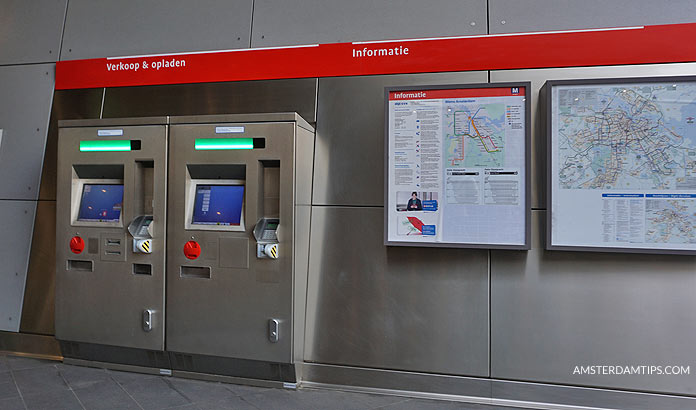
Note, multi-day tickets (5-7 days) can only be bought at a ticket office or online.
Amsterdam Metro Lines
The metro network is fast, efficient and passes through all the main business and office districts of the city including many Amsterdam rail stations.
There are 5 Amsterdam metro lines:
- M50 [Isolatorweg – Gein]
- M51 [Centraal Station – Isolatorweg]
- M52 [Noord – Station Zuid]
- M53 [Centraal Station – Gaasperplas]
- M54 [Centraal Station – Gein]
The lines in the inner city run underground like a classic subway before emerging overground at the outer periphery.
The following lines and stops are most useful to Amsterdam visitors:
Lines 51/53/54 run along the same route and platforms between Amsterdam Centraal and Amstel.

Useful stops include Nieuwmarkt (Chinatown area), Waterlooplein (Waterlooplein market/National Opera & Ballet/Rembrandt House/Our House/Jewish Museum/Portuguese Synagogue/H’ART Museum/Hortus Botanicus/National Holocaust Museum & Memorial/ARTIS Zoo/Micropia/Verzetsmuseum) and Wibautstraat (Canvas @ Volkshotel).
Line 54 can get you further on to Bijlmer-ArenA (Johan Cruijff ArenA stadium/AFAS Live/Ziggo Dome/OSCAM), Bullewijk (IKEA) and Holendrecht (Museum Vrolik).
Amsterdam North-South Line M52
In July 2018 the M52 Amsterdam North-South line opened which links the Amsterdam North suburb to Amsterdam South via the city centre. There is a separate M52 platform at Centraal Station which runs deeper than the other lines.
The 9.7km line was under construction between 2003 and 2018 and cost €3.1 billion.

Line 52 is the most useful with the following stops: Noord (bus station for Waterland fishing villages), Rokin (Dam Square and Spui Area), Vijzelgracht (Museum area), De Pijp (Albert Cuyp Market) and Europaplein (RAI Convention Centre, Upside Down Museum, Keukenhof bus stop).
It has significantly reduced journey times compared to taking the tram.
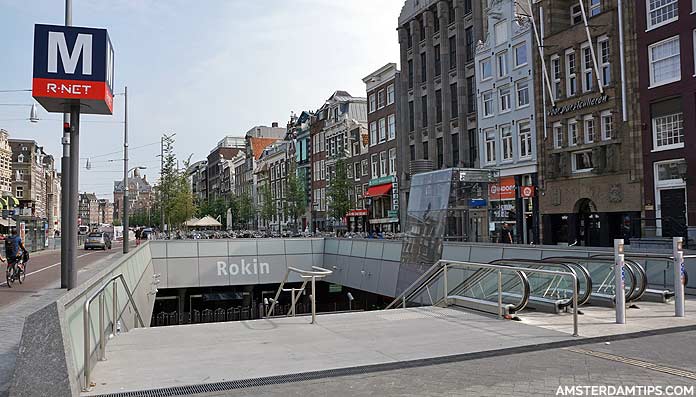
One fun aspect is that all of the M52 Amsterdam stations feature some form of artwork.
For example the Flyways birds on the platform at Noord, the 7 Gates brickwork sculpture at Noorderpark, the tiled walls and historic artefacts on display at Rokin and the light installation Ramses Shaffy, Lifelines at Vijzelgracht.

Amsterdam Metro Schedules
The Amsterdam metro runs daily from around 6am (weekdays), 6.30am (Saturday) and 7.30am (Sunday) to just after midnight.
Frequency of trains depends on the line and time of day.
Line M52 runs at 8-12 trains an hour (every 5-8 minutes) and all the other lines run at about 4-6 trains an hour (every 10-15 minutes).
Electronic boards on the platform will clearly tell you the upcoming departures.

Travel planners can be found at GVB’s website, the GVB app and online at 9292.nl. Alternatively, Google Maps and Apple maps have live transport info as well.
Amsterdam Metro History
The Amsterdam Metro first opened back in 1977 and originally just ran from Centraal Station to the south-east branches at Gaasperplas (53) and Gein (54).
In 1990 the ring line (51) from Centraal Station to Isolatorweg in the north-west was opened and the branch line (50) from Isolatorweg to Gein was added in 1997.
As mentioned the North-South line 52 was the last line top open in 2018.
The first generation rolling stock on the network were the distinctive M1/M2/M3 trains known locally as zilvermeeuw (herring gulls) – these were retired in 2015.

Amsterdam Metro Trains
There are currently 90 metro trains in the fleet with 3 different types of trains being used:
The long 6-car Alstom “Metropolis” M5 metro trains which can carry nearly 1,000 passengers and came into service in 2013.


The latest stock is the 3-car CAF M7 trains which entered service in 2023.

The older 2-car CAF S3 and M4 which have been in service since 1997.

Amsterdam Metro: Summary
Amsterdam has an excellent metro network which can get you around town and to the suburbs. Whilst the Amsterdam trams offer a more scenic ride at street level, the metro is certainly speedy and efficient.
Being accessible and spacious, the Amsterdam metro is always a good option for wheelchair users and large groups.
GVB multi-day tickets are the best value option and can be bought online here
This map and article was originally published in 2010 and has been regularly updated. Last update 12 March 2024.
Links on AmsterdamTips.com may pay us an affiliate commission.
